|
|
|
Sort Order |
|
|
|
Items / Page
|
|
|
|
|
|
|
| Srl | Item |
| 1 |
ID:
184995
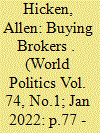

|
|
|
|
|
| Summary/Abstract |
Studies of electoral clientelism—the contingent exchange of material benefits for electoral support—frequently presume the presence of strong parties. Parties facilitate monitoring and enforcement of vote buying and allow brokers to identify core voters for turnout buying. Where money fuels campaigns but elections center around candidates, not parties, how do candidates pitch electoral handouts? The authors analyze candidates’ distribution of cash during an Indonesian election. Drawing upon varied data, including surveys of voters and brokers, candidates’ cash-distribution lists, and focus-group discussions, they find heavy spending but little evidence of vote buying or turnout buying. Instead, candidates buy brokers. With little loyalty or party brand to draw on, candidates seek to establish credibility with well-networked brokers, who then protect their turf with token payments for their own presumed bloc of voters. The authors find little evidence of monitoring of either voter or broker behavior, which is consistent with their argument that these payments are noncontingent.
|
|
|
|
|
|
|
|
|
|
|
|
|
|
|
|
| 2 |
ID:
126966
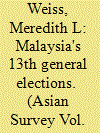

|
|
|
|
|
| Publication |
2013.
|
| Summary/Abstract |
The incumbent coalition claimed victory in Malaysia's 13th general elections in May 2013, securing a simple majority of parliamentary seats despite losing the popular vote. The dramatic result raises questions not only about the probity of the electoral process in Malaysia but also about the future of party politics there.
|
|
|
|
|
|
|
|
|
|
|
|
|
|
|
|
| 3 |
ID:
151472
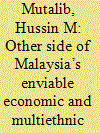

|
|
|
|
|
| Summary/Abstract |
Many governments, in their zeal to progress and deliver the fruits of development, are caught in a web of unsavory habits and practices that impair not only their international image but also domestic legitimacy. One such perennially persistent and resilient disease is ‘money politics.’ Taking Malaysia as a case study, we note that despite sustaining a remarkable record of economic and multiethnic stability, the country has also been helpless in mitigating this obstinate issue. In this article, it is posited that the phenomenon is not a new or recent portent but has actually persisted even prior to independence. We shall then contend that unless the ruling Barisan Nasional (BN) coalition government attaches greater priority in stamping out this political bug, the country’s otherwise enviable development trajectory and the quest to reach a ‘developed nation’ status via its Vision 2020 declaration, even if fulfilled, are not cause for celebration, given its implications to the country’s economic sustainability and multiethnic stability.
|
|
|
|
|
|
|
|
|
|
|
|
|
|
|
|
| 4 |
ID:
143665
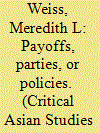

|
|
|
|
|
| Summary/Abstract |
A key part of what sustains electoral authoritarianism over the long term is genuine popular support. Dominant parties, particularly in a developmental context (the primary setting for such regimes), and especially where elections are more than minimally meaningful, curry performance legitimacy and loyalty not just through skewed rules and coercion, but through material incentives: “money politics.” If challengers can find a way to de-emphasize support based on material inducements, they stand a chance of securing gains via elections, rather than relying on economic downturns to shrink patronage coffers. Drawing on extensive original ethnographic and survey data from electoral-authoritarian Malaysia, I explore campaign finance and distributions on both sides in the latest, most regime-threatening general election, which was held on May 5, 2013. Evidence suggests that it was by disentangling clientelist networks from the patronage they so often serve to disseminate, allowing a focus on more programmatic than particularistic appeals, that the opposition Pakatan Rakyat alliance so nearly bested the long-dominant Barisan Nasional regime. Persona – being known and seen among the electorate – still matters as much as before, but relies less consistently than in the past on targeted patronage as a premise for loyalty.
|
|
|
|
|
|
|
|
|
|
|
|
|
|
|
|
| 5 |
ID:
083255
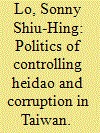

|
|
|
|
|
| Publication |
2008.
|
| Summary/Abstract |
The author examines the relationship between the Taiwanese government and organized crime. He argues that the government is relatively weak vis-à-vis organized crime, which has traditionally infiltrated the political system through elections and bureaucratic corruption. The weak anticrime apparatus and civil servants' and politicians' lack of ethical behavior provide fertile ground for political corruption to persist. Clean government's defenders include most prosecutors, court judges, media professionals, and social activists. But civil servants need to be educated on the values of public accountability, financial propriety, and personal ethics. Anticorruption bodies should be reformed, and a single authority should be vested with the necessary legal authority to curb graft in the private and public sectors. To improve its democratic image, Taiwan must consolidate its governmental capacity to control domestic crime and destroy the coalition between the heidao, money politics, and bureaucratic corruption.
|
|
|
|
|
|
|
|
|
|
|
|
|
|
|
|
| 6 |
ID:
098407
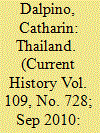

|
|
|
|
|
| Publication |
2010.
|
| Summary/Abstract |
Thailand runs the risk that future protes, a right and a mainstay of liberal democracy, will escalate quickly into violence and eventually be constricted as a matter of course.
|
|
|
|
|
|
|
|
|
|
|
|
|
|
|
|
| 7 |
ID:
151655
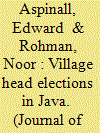

|
|
|
|
|
| Summary/Abstract |
To explore how democratisation is transforming Indonesia's rural elite, we examine two village head elections in Central Java. Despite the competitiveness of these elections, the campaigning modes employed by candidates, especially vote buying, points to elite continuity, because only wealthy villagers can compete for office. Moreover, links with higher state officials remain important for village elites, allowing them to win political support by obtaining projects from local government. However, rather than being incorporated as subordinates in a bureaucratic hierarchy as during authoritarian rule, village elites are now true rural brokers, exercising considerable leverage in their relations with the state.
|
|
|
|
|
|
|
|
|
|
|
|
|
|
|
|
|
|
|
|
|